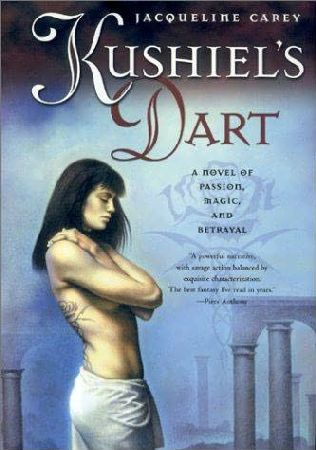Kushiel's Dart
by Jacqueline Carey

Reviewed by Coral
Phedre is born from an illicit relationship between a courtesan and a merchant’s son. As her mother did not seek approval from her House, their fortunes are left in the hands of Phedre’s father, who proves not to be unlike his father is when it comes to making money. Desperate, Phedre’s mother goes begging back to the Houses of the Night Court and Phedre finds herself sold to one of them. There she will be raised until she comes of age when she will be expected to become a courtesan herself.
But when they discover that Phedre is an anguissette, who derives pleasure from pain, she is sold once again, to Anafiel, a nobleman who is rumoured to have been an enemy of the late queen. She is taught to listen and to learn. She is to be his spy, as she is bedded by the country’s elite.
The country of Terre d’Ange sits on the brink of chaos. Their King is old and dying. The heir – his grand-daughter – is young and unmarried. Many factions inside the country look to prevent her from ever taking the throne, even looking to foreign powers to help them do it. With the nomadic tribes of the Skaldi uniting under one charismatic leader, war seems inevitable.
Can Phedre learn who amongst the crown’s inner circle is really conspiring against the princess?
I read all 900 pages of this book and I am still not sure if I liked it.
I was not comfortable with the idea of indentured prostitution as an accepted practice in the setting of the book. Looking over Phedre’s life, what choice did she really have in the matter? She was sold, more than once. Considering the enforced debt that she ‘owed’ to Anafiel for buying her, I don’t see how she could have refused. This very thing was touched upon with Alcuin, another courtesan-spy in Anafiel's ‘employment’. He disliked the whole courtesan part and only did it out of love for Anafiel. The whole thing was disturbing.
This lead to me finding the sexual relationship between Anafiel and Alcuin to be disturbing as well. Given that Alcuin was Anafiel’s indentured servant at one point, there was a imbalance of power in their relationship. Not to mention that at one point, considering that Alcuin’s paternity was unknown, the idea of Anafiel being his father was thrown around. Disturbing, all around.
Though not as bad as the last book I read by this author, I still don’t like the way she starts her books. In any book time needs to be taken to build the world of the book; this is especially true for fantasy books, where the history/science/magic of the world can be vastly different from the real world. Some authors can draw you in right away, while others, like this book, just have a clunky feel to them. Which is a shame, because I liked the concept of this world being set in a kind of alternate timeline, so that there were elements from our history that had been changed a little to make a new world.
One major problem was that, for a good portion of the book, Phedre didn’t know the bigger picture – so we didn’t either. She didn’t know why Anafiel had been enemies with the late queen, or what he was even looking for as he arranged her different assignations. Even after she finally gets the bigger picture, she is removed from the main action for more large chunks of the book.
At one point, near the end of the book, another character tells her that not everything can be won/negotiated/settled with sex. Seriously, that was how she solved everything. Worse, we are asked to believe that men and women who were involved in political conspiracies, would for a second forget who ‘owned’ her debt and reveal anything to her. Or that someone would decide to march off to war simply to get her into bed.
Considering the main tenant of Terre d’Ange was love where you will, it kind of bothered me that the marriages were all man and woman in the book, without a hint that anything else was acceptable. Setting aside the Royal House, where I could see marriage as a means to get an heir, I wish there had been at least one man/man or woman/woman marriage in the book, because considering the tenants of their beliefs it doesn’t make sense not to have them.
I still don’t know if I liked this book.
Grade: C